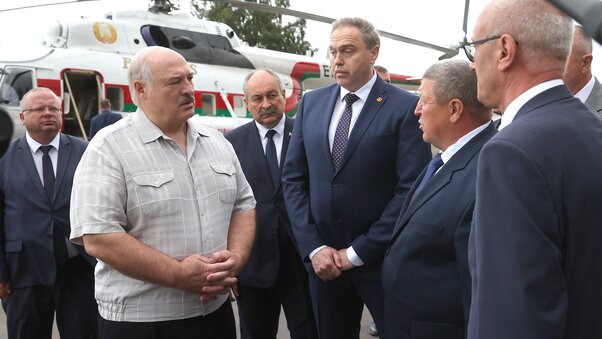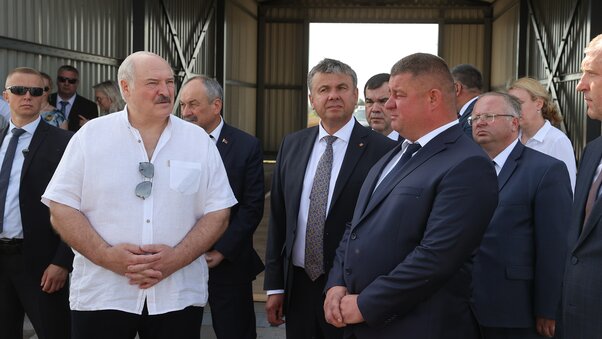Working trip to eastern regions of Belarus
- 10
- 9:28
Belarusian President Aleksandr Lukashenko instructed to study the experience of subsurface tillage which allows saving significant resources in farming.
Last week Aleksandr Lukashenko inspected the western regions of the country. This time he went to the eastern regions. The head of state visited the Start TS farm in Orsha District where he examined the subsurface tillage technology in one of the fields. The President outlined this issue as a strategic one and instructed to study the experience in order to make final conclusions next year.
Subsurface tillage is done with the use of special equipment. Crops are planted right on the stubble, at the desired depth; fertilizers are introduced.
"It's an ordinary field. Stubble after harvesting. We are using this equipment on the stubble. Do you guarantee that this field will grow what we want? Despite the fact that there is a sea of weeds here," Aleksandr Lukashenko asked.
Deputy Prime Minister Leonid Zayats explained that special agents will be used to suppress the growth of unnecessary grass and weeds. He reported that one of the farms used this technology and had a high yield of rapeseed and wheat. The harvest of corn was also good.
"We should do everything right. Harvest is the main thing. I think that we should try it. Let’s divide 50/50 between the new technology and traditional plowing," the President suggested the management of the farm. “We will try it here. The farm has an experience of subsurface tillage. But we need to approach this carefully, especially in the northern and eastern regions."
"Once the well-performing farms start having good production volumes, others will follow," the deputy prime minister said.
Aleksandr Lukashenko was also informed that this technology not only saves technical and fuel resources, but it has proved well during dry weather spells. Since soil is not turned over, it, accordingly, retains moisture better.
But the President still insists that such an innovation be approached carefully and that all possible pros and cons be studied closely. "Let's see what harvests you will get. But I say again: in traditional plowing we turn over the layer, and everything rots through. This produces humus, a fertilizer. Without turning soil things are faster, more efficient. Indeed, it is economical. Due to the introduction of a complex of fertilizers, we will get yields," he said.
"I suggest you plant some areas using the traditional technology and the new one to compare. We will see next year what will happen here. And then, if everything goes well, we will gradually switch to this technology not only here, but across the country. Farms will follow suit. We just need this equipment in sufficient numbers," Aleksandr Lukashenko said.
The President said that during his time at the helm of an agricultural enterprise, he studied a similar experience and tried the subsurface tillage technology. But weed control was extremely important: "I started working with this technology. But there was no one to advise us then. We did not know the technology well. It worked where there were no weeds. We had a sea of weeds here and the weather was always changing. I did not do proper work against weeds then. Therefore, you need to keep this in mind and work on weeds. Fertilizers must be introduced two or three times.
Experts say that in a couple of years the weed problem will sort itself out. When soil is not turned over, weed seeds do not get deep and do not have the opportunity to grow. With proper regular treatment of the top layer with chemical agents, the weed problem will gradually decrease and a field will be weed-free.
"In general, this technology is promising. Next year we will draw the final conclusions. And we will do it here," the head of state summed up.
Aleksandr Lukashenko noted that he visits the places where he can study and learn something new for the future. "This is one of the promising areas. Please suggest new technologies. We will come and see. This is our strategy," he said.
The head of state noted that if this experience justifies itself, then it will make sense to take on the path of optimization. After all, this technology allows saving significant fuel and technical resources. And, accordingly, fewer workers are required for the same amount of work. "Farms will not be able to have more personnel. And they don't need to. We need to retain the ones we have and pay them well. This is our strategy. We will see what it will lead to in the region. We need to try new things everywhere, and even in the north [Vitebsk Oblast]. We must try what we can. But carefully," the President said.
The head of state explained that a similar strategy is applied in other sectors of agriculture. For example, in animal husbandry, where it was decided to switch to modern complexes in the coming years. "This is a strategy in animal husbandry. The same goes for fattening, poultry farming, pig breeding sectors. This is all clear. We have long understood that these complexes hold the future. These are strategic issues," Aleksandr Lukashenko stressed.
During this working trip, Aleksandr Lukashenko also gave a number of tactical instructions regarding the current harvest campaign. One of them was about corn. It is high time to start preparing for the harvesting of this crop, deciding on silage and grain, getting the equipment ready: "The corn harvest is excellent. We have lower cereals harvest this year. We will make it up for by harvesting more corn. We need to prepare properly for the harvesting campaign."
Another task is to quickly remove straw from the fields and start planting winter crops. "If we delay the planting till October, as it happened in Vitebsk Oblast, then the result will be corresponding next year," the President said.
He also urged to share combine harvesters to help with harvesting.
Grass fodder is to be harvested soon too. After days of rains, the grasses began to grow nicely, and now farmers have to do many operations at the same time. "I warned you that this might happen. Now the grass is good. Clover is excellent. There will be two more clover harvests. We need more clover. It yields three to four crops. It is a good fodder crop," Aleksandr Lukashenko said.


